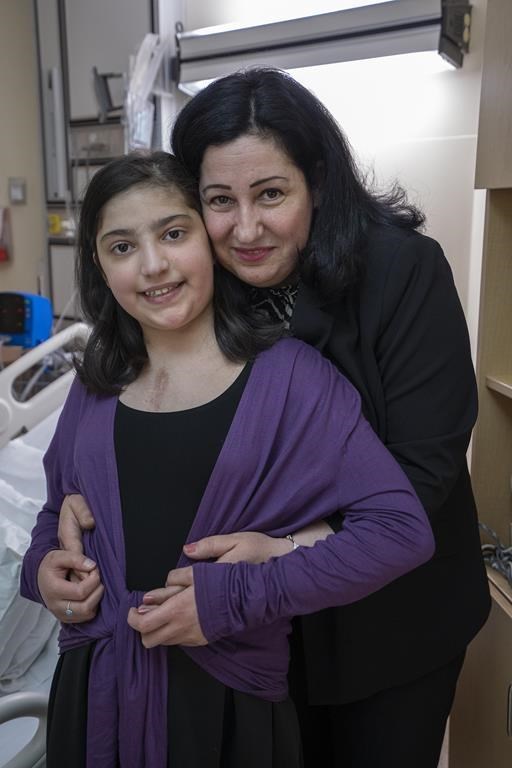TORONTO — Multiple heart surgeries and near-death experiences have earned 12-year-old Mariam Tannous the nickname Mariam Miracle, says her mom.
And for good reason: About one year ago the now-thriving pre-teen became the youngest person in Canada, and among the smallest in the world, to receive a device known as a total artificial heart.
Her doctors at Toronto's Hospital for Sick Children on Monday detailed their last-ditch measure to save her life when a previous transplant began to fail. It's all the more remarkable because such devices are only made for adults – the machine barely fit in Mariam's chest and after implantation her surgeon Dr. Osami Honjo says he left the cavity open for days because it "was just too big to close it right away."
Mariam's mother Linda Antouan Adwar recalls many tearful days praying for her daughter's recovery, and the elation she felt when she learned Mariam would be OK.
"She's a miracle. She's a strong girl. She loves life. She needs to be alive," says Antouan Adwar, describing a lively, active Grade 7 student who loves to swim, collect L.O.L. dolls and draw.
Mariam was born with two forms of congenital heart disease – Ebstein's anomaly caused a leaky valve and cardiomyopathy caused an ill-formed right ventricle.
She had open-heart surgery at the age of three and a heart transplant at age seven, but a steady decline at age 11 culminated in cardiac arrest in June 2021.Â
Antouan Adwar recalls the terrifying day Mariam suddenly collapsed at home. Her older brother administered CPR while they waited for an ambulance to SickKids. She was resuscitated and stabilized in intensive care but doctors recognized that her heart was giving out.
She would need a second transplant but also time to regain strength, time for her immune response to subside, and time to find a new organ.
Her cardiologist Dr. Aamir Jeewa says that led the medical team to the total artificial heart – a device that can essentially replace an entire human heart for a limited period of time. This is unlike other devices, which are designed to hook up to an existing heart to aid its function. It's only been used on 58 patients in Canada so far.Â
The procedure involves removing the heart's two main pumping chambers and replacing them with mechanical pumps that are surgically attached, explains Jeewa, head of the heart function program at SickKids.Â
Tubes run from the pumps, out of the chest and into a big wheeled console that operates 24/7 outside of the body.Â
Honjo recounts a 14-hour procedure in which he navigated scars from previous operations and had to place Mariam on a cardiopulmonary bypass machine for four-and-a-half hours.
When it came time to remove her from the bypass circuit, Mariam bled significantly and Honjo spent "hours and hours" to stop the bleeding.
Then it was time to close and the reality of reverse-engineering a device meant for an adult came to the fore, he says. The cavity was covered with a temporary patch for five days until Mariam's body could adjust to the device and her blood pressure could stabilize.
"We really wanted to close because obviously it's hardware sitting in a chest so we can't afford having the infection. But in her case, that was just too big to close it right away," says Honjo.
After surgery, Mariam remained sedated on mechanical ventilation for 16 days. During that time, blood and fluid accumulated around the device, requiring another operation.
"It was really, really difficult," says Honjo. "But somehow, she eventually stabilized. I can't explain why."
A heart for Mariam became available two months later, leading to another challenge: removing the device and connecting what amounted to her third heart implant. Now there was more scarring at the site, and the too-large device had compressed a systemic vein, says Honjo.
But as a specialist in complex congenital heart surgery for infants, Honjo was used to tricky operations and says the actual procedure was not as challenging as the broader medical care Mariam required to survive so many interventions.
Like Mariam's mom, Honjo leans on mystical terms to explain her survival: "It's magical."
"Surgically, I wasn't really nervous. But obviously, the team as a whole were quite uncertain whether or not she was going to make it," he says.
Mariam has ongoing challenges and will have to take immunosuppressant drugs every day for the rest of her life, says Honjo, although pediatric transplant patients tend to fare much better than adults.
Still, transplants are not a cure -- they can only extend one's life, says Jeewa, and it's highly likely Mariam's heart will fail at some point in the future.
What's important now is to make sure Mariam can live the best life she can, he says. Aside from regularly taking medication and seeing a cardiologist, she should be able to do what virtually most kids do.
"We want them to go to school, be active, play games, do all the normal things that an 11-, 12-year-old should do," Jeewa says of young transplant recipients.
Today, Antouan Adwar says Mariam is very much a typical kid embracing her summer school break, and the family is grateful to the entire medical team who brought her back from the brink of death.Â
She says Mariam swims four times a week and loves to play soccer and basketball with big brother Jack. And she's continued a passion for art that started at SickKids, where she would draw pictures of her family -- enclosed by a massive heart.
"We are so proud of what's happening. We are so proud of Mariam," says Antouan Adwar.
"She did a lot and she is strong. She showed everybody how strong she is."
This report by The Canadian Press was first published July 18, 2022.
Cassandra Szklarski, The Canadian Press




